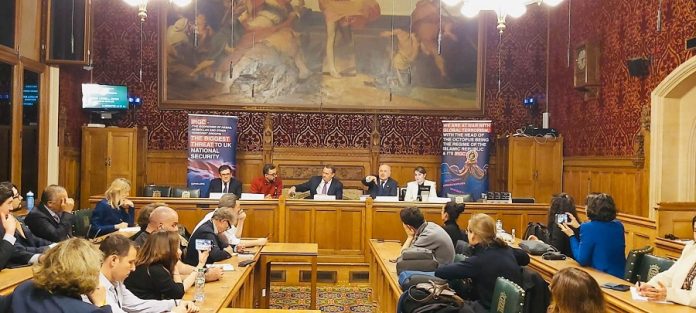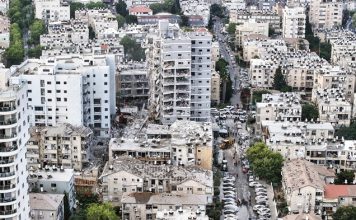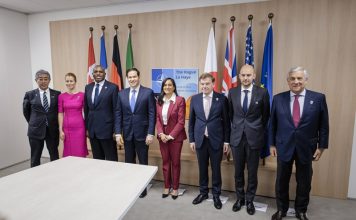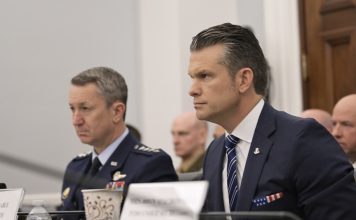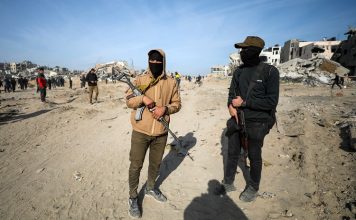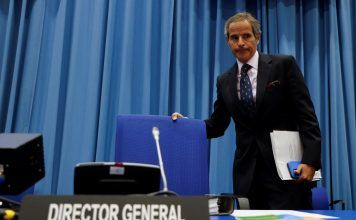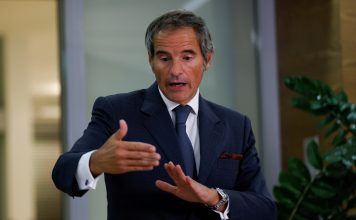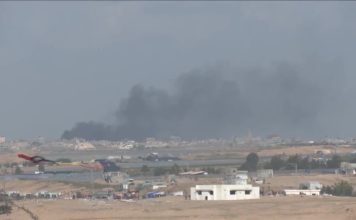Authoritarian states outnumber democracies in the world today, and Iran is part of a new totalitarian axis, said Ian Duncan Smith, a U.K. Conservative Party lawmaker who previously led the party and served as Secretary of State for Work and Pensions.
“If you look very carefully around the world, what you’re seeing is a growth of totalitarianism,” Duncan Smith said at a Nov. 14 conference in the British Parliament on the global influence of Iran’s Revolutionary Guard Corps (IRGC), organized by the International Organization to Preserve Human Rights (IOPHR), a London-based human rights group. “We are facing probably the single biggest growing threat of all, which is what I call the new axis of totalitarian states.”
[aesop_image img=”https://kayhanlife.com/wp-content/uploads/2023/11/IOPHR-Event-Parliament-14th-Nov-23-txt.jpg” panorama=”off” credit=”IOPHR Event Parliament 14th Nov 23. Images courtesy of the IOPHR” align=”center” lightbox=”on” captionsrc=”custom” captionposition=”left” revealfx=”off” overlay_revealfx=”off”]
“There are now more states that are totalitarian rather than democracies, and a lot of that is down to the Chinese involvement in this, who are using the Belt and Road initiative as a linkage between these, whether it’s China, North Korea, Russia, Iran,” Duncan Smith said.
[aesop_image img=”https://kayhanlife.com/wp-content/uploads/2023/11/UK-Parliament-Nov-2023-2.jpg” panorama=”off” credit=”Images courtesy of the IOPHR/. UK Parliament Nov 2023. ” align=”center” lightbox=”on” captionsrc=”custom” captionposition=”left” revealfx=”off” overlay_revealfx=”off”]
The event focused on the IRGC’s perceived role in the war between Ukraine and Russia and the Israel-Hamas war which began on Oct. 7, and its growing economic, trade and military ties with China.
The discussion was chaired by British lawmaker and former Defense Secretary Liam Fox. Fox is the chair of the UK Abraham Accords group, a forum to promote the Abraham Accords — a series of treaties normalizing diplomatic relations between Bahrain, Israel, Morocco, Sudan, the United Arab Emirates, and led by the US — which call for disputes between states in the Middle East to be resolved through dialogue rather than force.
Other speakers included:
- Jason Brodsky, Policy Director of the US-based advocacy group United Against Nuclear Iran (UANI);
- Leslie Vasylenko, Ukrainian lawmaker and lawyer;
- Mattie Heaven, Conservative party councillor and IOPHR Director; and
- Vahid Beheshti, Iranian human rights campaigner.
Lawmakers from other UK political parties such as the Labour Party and the Democratic Unionist Party also attended. Baroness Jacqueline Foster, a British Conservative politician and member of the House of Lords, was another attendee.
The Belt and Road Initiative (BRI), launched by China, is an ambitious new trade route which aims to connect China to the wider world. It has been designed to extend China’s economic, political and technological power. The BRI is viewed as a way for China to compete with the U.S. and make participating states dependent on China’s economy. Iran is one of 149 countries signed up to the initiative.
In a question to Fox regarding the Nov. 13 UK government reshuffle, which saw the appointment of former UK Prime Minister David Cameron as Foreign Secretary, Kayhan Life’s managing editor Nazenin Ansari asked: “Given Cameron’s closeness to the Chinese government, do you think that this influence will be for the better [regarding the UK’s Iran policy], or that we won’t see any change?”
Fox replied that Cameron had agreed this week to have a meeting with him about Iran, and added: “I take that as a positive sign of greater engagement with the region.”
Panelists criticized what they said was a failure by the current government to address concerns raised by the Iranian regime’s activities in the Middle East, Ukraine and the UK. The panelists also expressed concerns about the government’s ongoing refusal to proscribe the IRGC as a terrorist organization.
“It is our duty to show solidarity with the people of Iran. When we look at deeply destructive interference that Iran has in Iraq and Syria, through Hezbollah, Hamas, we cannot be blind and we cannot be inactive,” Fox said.
Iran’s regime has provided funding, training and weapons to several militia groups including the Gaza-based Hamas and Lebanese Hezbollah. The US in 2019 designated the IRGC as a terrorist organization for its support of these groups.
“In the United Kingdom, all the IRGC proxies are listed as terrorist organizations: Hezbollah, Hamas, Palestinian Islamic Jihad, but not the mothership itself, the IRGC,” Brodsky said. “That creates an inconsistency that undermines the integrity and coherence of counterterrorism efforts.”
“The IRGC is the great destabilizer at home and abroad. In Ukraine, in its arming of Russia with lethal drones, and it has armed and funded Hamas so much so that Hamas would not be Hamas without the IRGC,” Brodsky said.
In recent months, British lawmakers from a wide range of parties have called for the IRGC to be proscribed. The government has so far refused to do so, amid fears that a listing could sever the increasingly delicate diplomatic relationship between Iran and the UK.
Discussing the Iranian regime’s involvement with the Ukraine-Russia war, which Iran has denied, Vasylenko said: “When it comes to the impact of Iran on the situation in Ukraine, it has been huge. In just 12 months, 2,000 Iranian ‘Shahed’ drones have been launched on Ukraine.”
“Iran was the first country to step up when Russia realized that it did not have enough weapons to continue the fight in Ukraine,” Vasylenko added.
US, UK Impose New Sanctions on Iran Regime-Funded Hamas Following Attack
Heaven said the IRGC’s involvement in global conflicts had been made possible by its axis of resistance: proxies made up of political parties and armed groups based in Afghanistan, Iraq, Lebanon, Palestine, Syria and Yemen.
The network, led by Iran’s regime and supported by the IRGC, is connected to an ideology which seeks to free itself from the influence of Israel, the US and its allies in the Middle East.
Moving on to the threats posed by the IRGC in the UK, Heaven said: “Our streets are not going to become safer as things stand.”
On Oct. 27, the Times of London reported that the IRGC was involved in spreading disinformation and funding protesters during the Pro-Palestine rally on Nov. 11. Heaven’s husband Beheshti, who has been on hunger strike outside the British Foreign Office for more than 70 days, said he had been attacked by protesters at the rally. Beheshti claimed the protesters were carrying images of Ayatollah Ali Khamenei and General Qasem Soleimani, a former IRGC chief assassinated in Iraq by US forces.
“They were proudly supporting Hamas, Hezbollah and the IRGC, they were attacking our camp, and one man threatened to behead us,” Beheshti said. “When he was arrested by the police, they found a big knife in his backpack.”
A February report by the UK’s domestic intelligence agency MI5 confirmed at least 15 foiled assassination and kidnapping plots of UK citizens considered to be enemies of Iran’s regime.
The panelists at the conference shared additional proposals for dealing with the Iranian regime, including: shutting down Iranian businesses and charities operating in the UK with links to the IRGC, reviewing the 2015 nuclear deal, closing Iranian banks operating in the UK, and the development of a “credible military threat” to deter the regime.

